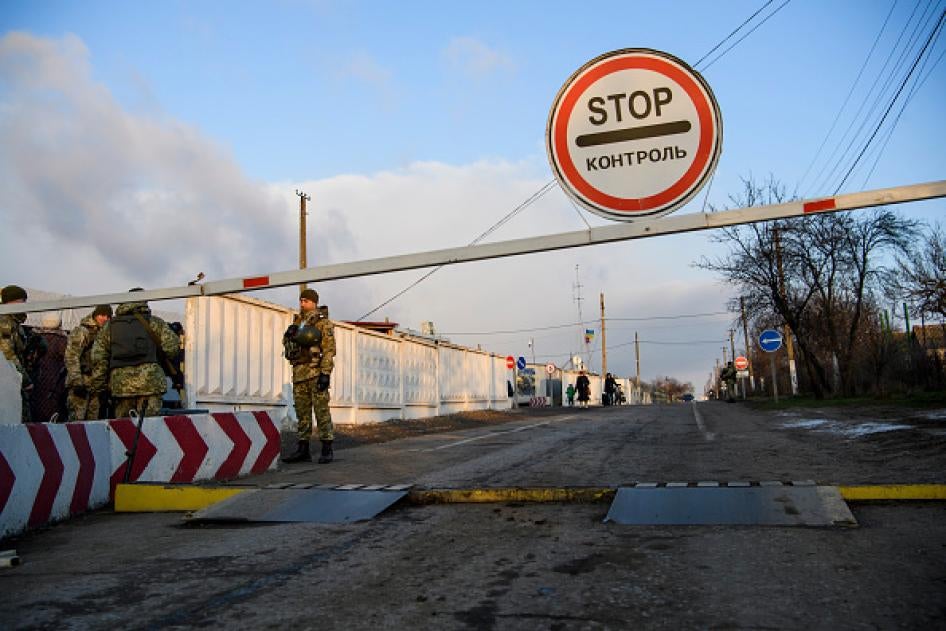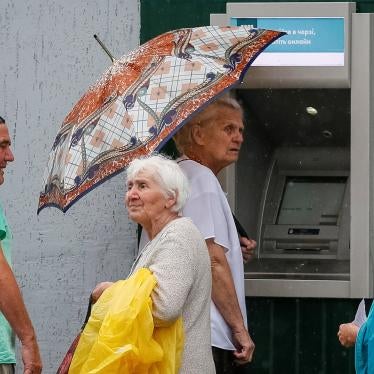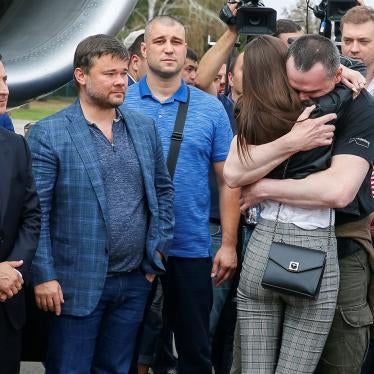(Kyiv) – Ukrainian authorities, in response to the threat of COVID-19, shut down all movement across the line of contact in eastern Ukraine, but they have not made adequate provisions for those who may be stranded as a result, Human Rights Watch said today. The line separates areas under the control of Russia-backed armed groups from those under government control.
“Ukraine is facing a public health emergency, and the government has every reason to limit movement, including in the conflict-affected areas of Donetsk and Luhansk regions,” said Rachel Denber, deputy Europe and Central Asia director at Human Rights Watch. “At the same time, it should strive to keep families together and ensure the humanitarian needs of people who get stranded.”
Dozens of people have been stranded for days at a checkpoint in eastern Ukraine, unable to cross into areas not controlled by the government and in many cases without the financial means to shelter in decent conditions. In a positive development, on April 1, Ukrainian authorities allowed 26 of 60 people to cross at Stanitsa Luhanska into non-government-controlled areas. They should now strive to resolve the plight of those who remain stranded, either by allowing them to cross to rejoin their families, or helping to accommodate them while they wait. If Ukrainian authorities allow them to cross, authorities in non-government-held areas should allow them to enter.
On March 22, 2020, as part of their efforts to battle COVID-19, Ukrainian authorities issued an order closing indefinitely all movement across the line of contact. As of April 1, Ukraine had a total of 794 COVID-19 cases and 20 deaths. The country has been on a lockdown since March 18, with schools, borders, and nonessential business closed.
The armed conflict between Ukrainian forces and Russia-backed armed groups in these regions has been ongoing for six years. Since 2014, people who need to cross this line to work, visit family, collect pensions, and the like, must go through checkpoints. In January 2020 alone, there were 1,067,899 crossings.
The March 22 order allows for exceptions in emergencies, such as the death or severe illness of a close relative, and requires people to provide supporting documentation. It does not indicate when regular travel across the line of contact would recommence. Right to Protection, a Ukrainian group that provides legal and other assistance to people displaced by the armed conflict, said that people flocked to crossing areas, hoping they could convince authorities that their situation warranted an exception.
The group said that in the days following the March 22 order, the authorities allowed people to cross for family reunification, but stopped on March 27.
On March 28, the authorities announced that the administrative borders between Donetsk and Luhansk regions and the three adjacent regions would also be closed indefinitely. The announcement was made on Ukraine’s Joint Forces Facebook page, only about eight hours before it went into effect. Right to Protection told Human Rights Watch that some of the people stranded at the line of contact had found out about the new order too late to return to their starting point.
Right to Protection said that all those stranded were at the crossing point at Stanitsa Luhanska, the only crossing point in Luhansk region. Local authorities have made no arrangements to accommodate them while the crossing point is closed. Two people, including a woman who is over age 60, had been sleeping under a tarp at the checkpoint. In recent days, temperatures in Stanitsa Luhanska have been dipping to between one and minus three centigrade. A humanitarian group had offered to find accommodation for the woman, but she declined because she did not have money to buy food, and believed she could count on food donations in the border crossing area.
Some of those separated are concerned about how their families will cope if they are not home. A man who identified himself as Maksim told Human Rights Watch by phone that the border closure is separating him from his family in Luhansk, including his wife, four-year-old daughter, and parents, who are over age 70.
“I need to go home, I’m the only breadwinner in the family,” he said. It took Maksim over two days to reach the crossing, arriving on March 25, where Ukrainian forces rejected his three requests for permission to cross, telling him he didn’t have grounds. Maksim pays 100 hrivna (approximately US$3.60 per night) to stay at a hostel near the crossing.
Yuri, who works in Kyiv, spent 3,000 hrivna on a taxi to get to Stanitsa Luhanska. But when he requested permission to cross, officials told him he didn’t have valid reason. He told Human Rights Watch he spent a night on the street near the crossing point, doesn’t have enough money to return to Kyiv even if the administrative border were open, and is now spending up to 130 hrivna per night on a hostel. “I just want to go home,” he said. “My mother’s there, shelling has started again [in our village] and it’s hard for her to be alone.”
Others who are stranded are also staying in hostels where they sleep several people to a room and change rooms and roommates every night, increasing chances of exposure to the virus.
“This is a human crisis that needs a human response,” Denber said. “Ukrainian officials and the de-facto authorities should do everything they can to reunite families as quickly as possible, and to ensure that at the crossing points everyone is maintaining social distancing. They should also ensure that in the interim, anyone stranded can stay in dignified conditions.”









